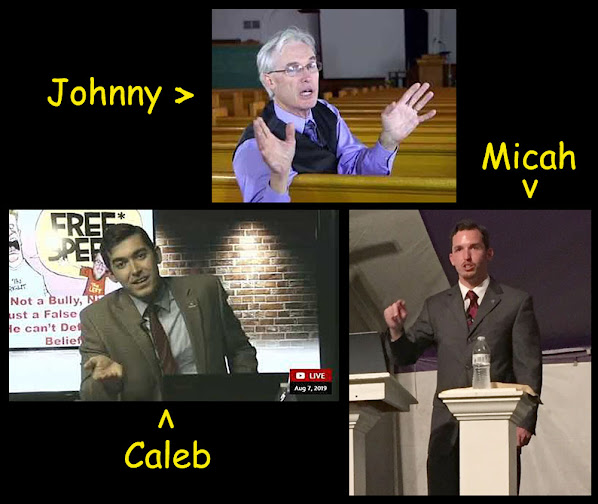What are the chances - or - Another set of Minimal Facts
A theologian is like a blind man in a dark room searching for a black cat
which isn't there - and finding it.
~unknown
Does the confirmation of one fanciful or absurd claim mean that another fanciful or absurd claim is true by association?
For instance:
Fanciful / Absurd claim #1 - I can slam-dunk a basketball on a regulation goal from a standing jump. (note - I am 5'6" tall, 65 years old, with a degenerated disk in my lower back)
Fanciful / Absurd claim #2 - I am a billionaire. (note - I live in a 35 year old mobile home and drive a well-used 1999 model vehicle)
Now, if I took you out to our local rec-center and proved to you that Fanciful / Absurd claim #1 was true, wouldn't it still be wise of you to require evidence of my Fanciful / Absurd claim #2? Just because I proved to you with convincing evidence one fanciful or absurd claim - does not / should not - in any way mean, that you should trust me that my 2nd claim is also true. You would be wise in maintaining a skeptical attitude toward my 2nd claim until I provide convincing evidence.
~ ~ ~
The bible has many fanciful and/or absurd claims, from the very first chapter in Genesis to the last chapter in Revelations. For instance, let's say that the Genesis flood (Gen. 7) has been confirmed by science, confirmed to the point that now no scientist has any doubt that a world-wide flood occurred some 4,000 years ago, as described in the bible. Would those scientists be justified in being as confident (without any confirming evidence) that a disembodied hand wrote on a wall as claimed in Daniel 5, just because that story is also described in the bible?
I would sincerely hope that every Christian would agree - that would be crazy thinking - and yet that is exactly how so many Christians think. They accept so many biblical claims as being true without even a shred of confirming evidence, just because the story is found in the bible.
~ ~ ~
Christianity rises or falls on the claimed resurrection of Jesus from the dead. But even if it could be proven that he did indeed rise from the dead, that would in no way suffice as proof by association that he was born of a virgin, or that he walked on water, or that he raised numerous other people from the dead.
I used to be a Christian. I used to believe in the bodily resurrection of Jesus. I no longer believe fanciful and absurd claims simply because of where the claims originate. The claimed resurrection of Jesus is just another fanciful and absurd claim that I can not believe until I am convinced by evidence.
I have no desire for the claimed resurrection of Jesus to be true or false. If convincing evidence that it did occur were provided to me, I would be convinced.
~ ~ ~
Was there a person named "Jesus" living in 1st century Palestine? I suspect that is a definite possibility / probability. For the sake of argument, I concede that the Jesus of the bible (or at least a person that bible-Jesus is loosely based on) did live during that time. I am not conceding that this Jesus was born of a virgin or walked on water, I am just conceding that the Jesus of the bible may have been based (to one degree or another) on a man who actually lived during that time.
Was this Jesus an end-times "prophet", preaching repentance and salvation? Sure, I'll concede that.
Was this Jesus crucified by the Romans at the wishes of the religious powers-that-be at that time? I'll concede that as well. We all know how cruel, controlling, and hypocritical religious leaders can be, and it does seem that the Romans used crucifixion as a method of execution, especially for those whom they considered a threat to Roman rule.
What are the chances that the Jesus of the bible was actually raised from the dead and appeared to other people (apostles, disciples, 500 followers, etc) as is believed by Christians today and Christians throughout history?
What are the chances that the Lazerous of the bible actually rose from the dead at the command of Jesus?
What are the chances that there were many other dead people who were raised from the dead and were seen walking around town after the claimed resurrection of Jesus? Is there any reason at all that I should give these bible claims consideration?
What if we allow that perhaps these bible claims of a resurrected Jesus are actually the result of mistaken identity? What if these claims are the result of some people seeing a man and mistaking that man for a resurrected Jesus? Surely we all have seen someone who looks a lot like someone else:
Are these photographs below of the same person,
two different people,
three different people?
Did Jesus have a brother? I submit that we can be just as confident that Jesus had a brother as we can be confident that Jesus existed at all.
The Nag Hammadi copy of the Gospel of Thomas begins: "These are the secret sayings that the living Jesus spoke and Didymus, Judas Thomas, recorded." Early Syrian traditions also relate the apostle's full name as Judas Thomas. Some have seen in the Acts of Thomas (written in east Syria in the early 3rd century, or perhaps as early as the first half of the 2nd century) an identification of Thomas with the apostle Judas, Son of James, better known in English as Jude. However, the first sentence of the Acts follows the Gospels and the Acts of the Apostles in distinguishing the apostle Thomas and the apostle Judas son of James. Others, such as James Tabor, identify him as Jude, brother of Jesus mentioned by Mark. In the Book of Thomas the Contender, part of the Nag Hammadi library, he is alleged to be a twin to Jesus: "Now, since it has been said that you are my twin and true companion, examine yourself . . . "
The word Thomas even comes from the Aramaic word t'oma' which means "twin".
Mark 15:40
There were also women looking on from a distance. Among them were Mary Magdalene, and Mary the mother of James the younger and of Joses, and Salome,
Today, the chances of having twins are about 1 in 250 natural pregnancies (without the use of fertility drugs). I suspect that 2,000 years ago the chances of having twins was at least close to what it is today.
What are the chances of being raised from the dead? I mean, actually dead - buried or entombed - for at least a few days, then coming back to life and walking around town?
1 in 250,000,000,000,000,000,000,000,000.000,000,000,000,000,000,000,000,000,000,000,000 ?
But it's not just Jesus who is claimed to have been raised from the dead - we have:
~ Lazerous - whom Jesus raised from the dead.
~ Lazerous - whom Jesus raised from the dead.
~ The dead man in the town of Nain - whom Jesus raised from the dead.
~ The man who fell out of the window - whom Jesus raised from the dead.
~ All the people who (supposedly) were raised and walked around when Jesus was raised from the dead - what was the purpose of this mass resurrection?
~ All the people who (supposedly) were raised and walked around when Jesus was raised from the dead - what was the purpose of this mass resurrection?
~ ~ ~
Gary Habermas
Gary Habermas touts certain "Minimal Facts" concerning the claimed resurrection of Jesus. He claims that the majority of even critical experts accept these "minimal facts". I hesitate to post these "minimal facts" because they seem to have changed over the years, both in substance and in number - why - I don't know for sure, but they go something like this:
1 - Jesus died by crucifixion.
2 - Jesus' followers believed they saw Jesus alive after his death.
3 - Jesus' followers were transformed because of this resurrection belief and were even killed because of their resurrection faith.
4 - Jesus' followers preached that they believed Jesus had raised from the dead very soon after his death.
5 - Jesus' unbelieving brother, James, became a Christian after thinking he saw Jesus alive after his death.
6 - The Apostle Paul (formerly Saul of Tarsus, a persecutor of Christians) also became a Christian after thinking a bright blinding light was Jesus alive after his death.
2 - Jesus' followers believed they saw Jesus alive after his death.
3 - Jesus' followers were transformed because of this resurrection belief and were even killed because of their resurrection faith.
4 - Jesus' followers preached that they believed Jesus had raised from the dead very soon after his death.
5 - Jesus' unbelieving brother, James, became a Christian after thinking he saw Jesus alive after his death.
6 - The Apostle Paul (formerly Saul of Tarsus, a persecutor of Christians) also became a Christian after thinking a bright blinding light was Jesus alive after his death.
Much ink has been spilt both refuting and supporting these minimal facts. I won't bother offering my critique. Instead, I'll just offer my own version:
bob's "minimal facts":
1 - The chances of Jesus having a brother - possibly a twin brother - are far, far greater than the chances of Jesus (or anyone else, ever) dying and then coming back to life.
1a - The claimed appearances of Jesus after he was dead are embellishments based on legend - or - they are mistaken appearances of Jesus's brother, possibly a twin brother.
2 - If Jesus was placed in a tomb, and later the tomb was found empty, as the bible describes, his body was either taken by the Roman authorities, by Jesus's enemies, or by Jesus's friends or family, and disposed of in some manner. (tomb raiding was common
https://en.wikipedia.org/wiki/Stolen_body_hypothesis )
2a - It is likely that the story of Jesus being entombed is made up, and he was actually thrown into a mass grave with other criminals, as that was the common practice.
3 - The Jesus of the bible died 2,000 years ago and is still dead. He is not coming back.
3a - Unfortunately, followers of Jesus made false or mistaken claims and those claims found their way into the bible, and those false claims have been believed, spread and defended for generations, but in the end, they are still just claims.
4 - Modern day Christianity is made up entirely of millions of believers who have never had a prayer answered, never actually experienced or actually witnessed a miraculous or supernatural event, and have never had any communication or interaction with the god that they claim to have a "relationship" with.
4a - In spite of this, modern day Christians still hold to their irrational beliefs.
~ ~ ~
A rational belief is one, where every attempt has been made to eliminate the influence of cognitive biases upon the act to believe, and one where belief-revision is practiced in the same manner upon acquisition of new evidence.
A faith-based belief is one, where little or no attempt has been made to eliminate the influence of cognitive biases, even to the extent of engaging in activities that use cognitive biases to aid in that belief formation.
~unknown
The evidentiary threshold people use to confirm their existing beliefs is far lower than that used to change them.
~unknown
Not once has an apparent natural event turned out to have a supernatural cause, and not once has an apparent supernatural event turned out NOT to have a natural cause.
~unknown
bob
r.u.reasonable@gmail.com






Comments
Post a Comment